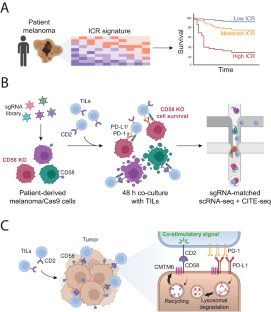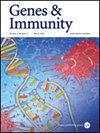From patient tissue correlates to molecular mechanisms of cancer immune evasion: the emerging role of CD58 and PD-L1 co-regulation via CMTM6
IF 5
3区 医学
Q1 GENETICS & HEREDITY
引用次数: 0
Abstract
Immune evasion is a hallmark of cancer, yet the underlying mechanisms are often unknown in many patients. Using single-cell transcriptomics analysis, we previously identified the co-stimulator CD58 as part of a cancer cell-intrinsic immune checkpoint resistance signature in patient melanoma tissue. We subsequently validated CD58 loss as a driver of immune evasion using a patient-derived co-culture model of cancer and cytotoxic tumor-infiltrating lymphocytes in a pooled single-cell perturbation experiment, where we additionally observed concurrent upregulation of PD-L1 protein expression in melanoma cells with CD58 loss. In our most recent study, we uncovered the mechanisms of immune evasion mediated by CD58 loss, including impaired T cell activation and infiltration within tumors, as well as inhibitory signaling by PD-L1 via a shared regulator, CMTM6. Thus, cancer cell-intrinsic reduction of CD58 represents a multi-faceted determinant of immune evasion. Furthermore, its reciprocal interaction with PD-L1 via CMTM6 provides critical insights into how co-inhibitory and co-stimulatory immune cues are regulated.


从患者组织相关性到癌症免疫逃避的分子机制:CD58 和 PD-L1 通过 CMTM6 共同调控的新作用
免疫逃避是癌症的特征之一,但许多患者往往对其潜在机制一无所知。此前,我们利用单细胞转录组学分析,在黑色素瘤患者组织中发现了辅助刺激因子 CD58,它是癌细胞内在免疫检查点抗性特征的一部分。随后,我们在一次集合单细胞扰动实验中,利用患者衍生的癌症和细胞毒性肿瘤浸润淋巴细胞共培养模型验证了 CD58 缺失是免疫逃避的驱动因素,我们还在 CD58 缺失的黑色素瘤细胞中观察到了 PD-L1 蛋白表达的同时上调。在我们最近的研究中,我们揭示了 CD58 缺失介导的免疫逃避机制,包括肿瘤内 T 细胞活化和浸润受损,以及 PD-L1 通过共享调控因子 CMTM6 发出的抑制信号。因此,癌细胞内在的 CD58 减少是免疫逃避的多方面决定因素。此外,CD58通过CMTM6与PD-L1的相互影响为我们提供了关于如何调节共同抑制和共同刺激免疫线索的重要见解。
本文章由计算机程序翻译,如有差异,请以英文原文为准。
求助全文
约1分钟内获得全文
求助全文
来源期刊

Genes and immunity
医学-免疫学
CiteScore
8.90
自引率
4.00%
发文量
28
审稿时长
6-12 weeks
期刊介绍:
Genes & Immunity emphasizes studies investigating how genetic, genomic and functional variations affect immune cells and the immune system, and associated processes in the regulation of health and disease. It further highlights articles on the transcriptional and posttranslational control of gene products involved in signaling pathways regulating immune cells, and protective and destructive immune responses.
 求助内容:
求助内容: 应助结果提醒方式:
应助结果提醒方式:


